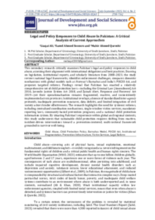This secondary research critically examines Pakistan’s legal and policy responses to child abuse, assessing their alignment with international obligations and best practices. Drawing on legislation, institutional reports, and scholarly literature from 2008–2023, the study reviews national legal frameworks, identifies enforcement challenges, compares domestic mechanisms with global models such as Norway’s Barnahus and India’s POCSO Act, and proposes targeted reforms. Findings reveal that Pakistan has enacted a relatively comprehensive set of child protection laws—including the Criminal Law (Amendment) Act 2016, Juvenile Justice System Act 2018, and Zainab Alert, Response and Recovery Act 2019—yet their operationalization remains fragmented, reactive, and inconsistently implemented across provinces. Institutional overlaps, absence of standardized inter-agency protocols, inadequate prevention measures, data deficits, and limited integration of civil society actors hinder effectiveness. The research highlights the need for systemic reforms, including centralized coordination mechanisms, single-window victim services, mandatory reporting laws, community-based prevention programs, and a national child protection information system. By situating Pakistan’s experience within global and regional contexts, this study underscores that sustainable child protection requires shifting from reactive, incident-driven interventions toward a prevention-centered, multi-sectoral framework grounded in survivor well-being.

